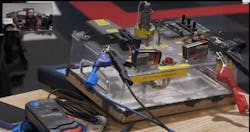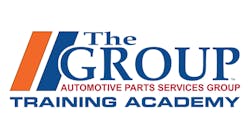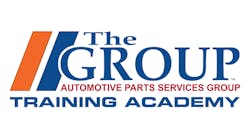There’s training, and then there’s training. There’s the training you sit through because you were told you had to, and there’s training you engage with because you don’t have any other choice—neither for your skill set nor for your shop. That kind of training—the good stuff, the deep cuts, the hands-on, heads-up, nail-biting and cutting edge-of-your-seat nitty gritty—can only signal one thing. The future is coming. Better get in gear.
“I’m learning to run my shop,” says Shaunt Hovnanian, owner of Quality Auto Repairs (Toront, Canada), “what else am I here for?”
Hovnanian recently completed the latest in electrical training from The Network Academy’s new Technicians Coaching program. His instructor, John Forro, is top of the line. “[John] really knew what he was doing,” Hovnanian says. “And if it were merely performative, I wouldn’t be interested.”
That’s because Hovnanian has long been known as “the electrical guy” in his area. Dealerships and other shops often send work his way because their teams aren’t poised to handle electrical work, which is increasingly on the rise as today’s vehicles house miles of wires, mounds of modules and caches of computer components.
“The future is electric, right?” he says. “The future is hybrid and electric vehicles. I’d like to get ahead of it.” Though he admits he didn’t quite know what to expect going into the class, he came out the other side more equipped to meet that future head-on.
“The hybrid stuff was very valuable and the deeper the class went, the more involved and intricate the training became.”
What separates The Network Academy’s training program from its competitors is the technical quality and hands-on aspect of it. Instead of discussing standalone parts or how to install something on a car that isn’t there, the car is, well, there; Forro works from a studio with a full vehicular setup, multiple cameras and angles and the ability to show not just how to install something, but why, and even show how the piece or module may have been broken in the first place.
Students have the ability to ask live questions during any repair or presentation. After covering theory, Forro launches directly into repairs, building upon each session and fostering as much dialog as possible with his virtual students.
As a student, Hovnanian was proactive in his pursuit of better training. “It seems like a wasted opportunity not to ask questions,” he says, “because what The Network Academy offers is priceless knowledge. What, are you just going to sit around? I asked about a follow-up course, and John said it’s in the works.”
Even the price was right for Hovnanian; he notes that usually the best training courses run upwards of $800 or even $1,000. “For a reasonable price, this was very good,” he says. “You could do a lot worse for the money.” The list price is $600 ($450 if you’re a Platinum or All Access Pass member to AVI.
More than anything, Hovnanian faces the same issues as many shop owners—how do you ensure the best repairs at a reasonable price and ensure your shop moves forward?
“I don’t want to rely on quantity instead of quality,” he says, “and we don’t want to compete with the cheapest out there.”
To do that, you need to know what to charge for the most up-to-date repairs and the skills needed to conduct them. And that is what training—the real training—is all about. The kind of training that The Network Academy provides.



